In the recent Caritas 2021 report, the new poverty in the city of Rome emerges. In 48.7% of cases, the new people (7,476) who turned to parish centers are Italian, followed by Filipinos (16.3%), Peruvians (4.9%), Romanians (4.7%) and 97 other nationalities. In 64.4% of cases, the representative of the family who crossed the threshold of the counseling center for the first time is a woman. 54% of new members are under 45 years old. Dramatic and eloquent figures.
Whoever will be the new mayor of Rome will immediately have to face, among the first emergencies, that of new poverty. Pope Francis reminds us that "no one is saved alone": a perfect expression as a very secular warning for restart of the city, to leave behind the disaster in which we are struggling.
On Tuesday 12 October the Di Liegro Foundation organized a mass celebrated by archbishop Gianpiero Palmieri, vicegerent of the Diocese of Rome, for remember Monsignor Luigi Di Liegro 24 years after his death, Don Gigi for everyone, who founded the Diocesan Caritas of Rome in 1979.
Monsignor Palmieri said: «Don Luigi Di Liegro had a profoundly biblical vision of the city: a place where men live together, a collective body in which we are all called to participate. A living body that asks to be honored
by each of its members."
Also a very secular reminder. Rome can and must start again but it cannot and must not leave anyone behind.
From the Corriere della Sera of 18 October 2021
On Tuesday 12 October, we met at the Basilica dei SS Apostoli in Rome, to remember Don Luigi Di Liegro 24 years after his passing. Many friends of Don Luigi and volunteers at the Eucharistic celebration, promoted by the Don Luigi Di Liegro Foundation. Also present were Monsignor Benoni Ambarus, auxiliary in charge of the pastoral care of charity, the prefect of Rome, Matteo Piantedosi, and the director of Caritas, Giustino Trincia.
"Don Luigi Di Liegro had a profoundly biblical vision of the city: a place where men live together, a collective body in which we are all called to participate. A living body that asks to be honored by each of its members". Thus Archbishop Gianpiero Palmieri, vicegerent of the Diocese of Rome, remembered the first director of Caritas.
In the homily, commenting on the Gospel passage, Monsignor Palmieri highlighted how "Jesus' sharp irony towards the Pharisees - who worry about ablutions and cleaning the plate to be pure before God - reminds us of the life and work pastoral ministry of Don Luigi who never stopped testifying that only love makes us pure before the Lord".
"We are not the memory of a person who died, we are the awareness of a great gift that God has given to the Church and to the city of Rome: Don Luigi. His memory - added Monsignor Palmieri - is a living memory, these are our dreams shared by Don Luigi Di Liegro to be witnessed, so that they become visions for young people today"
View the photo gallery
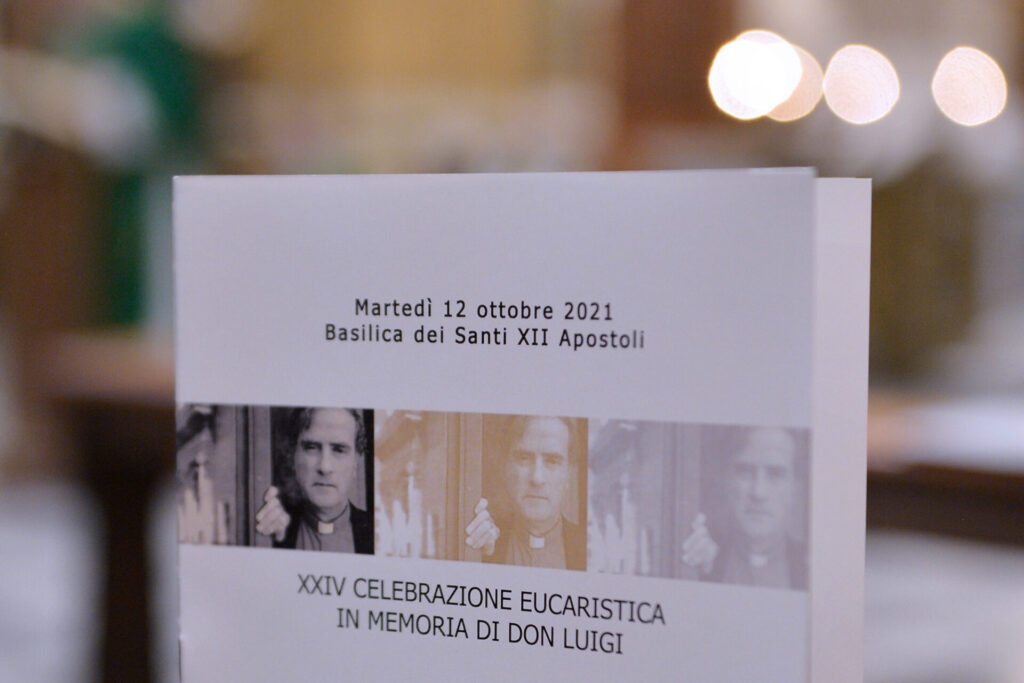
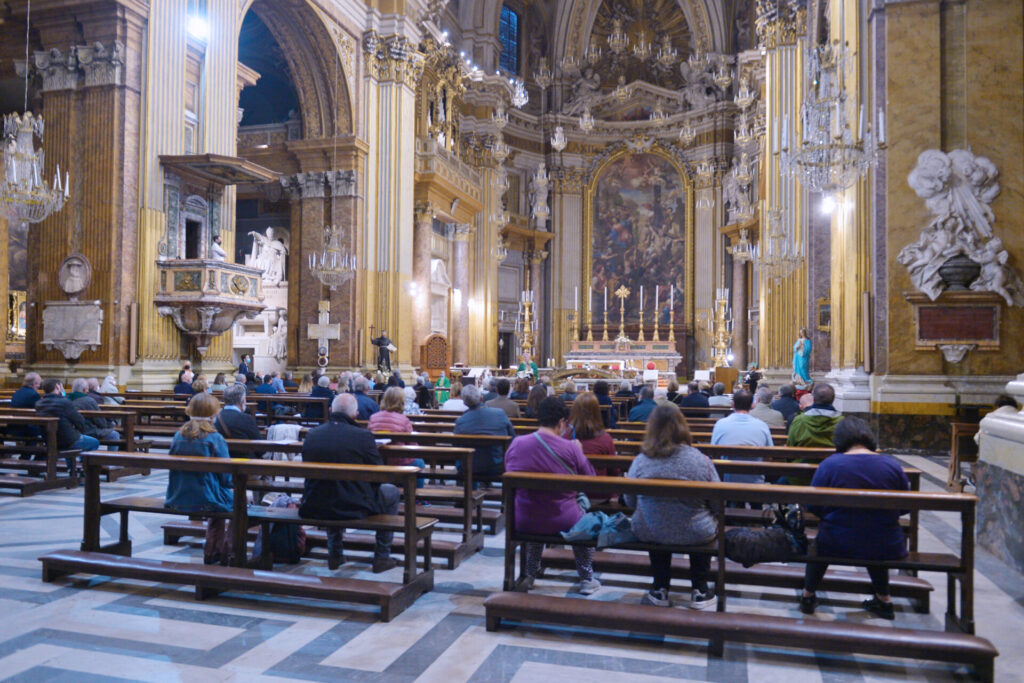

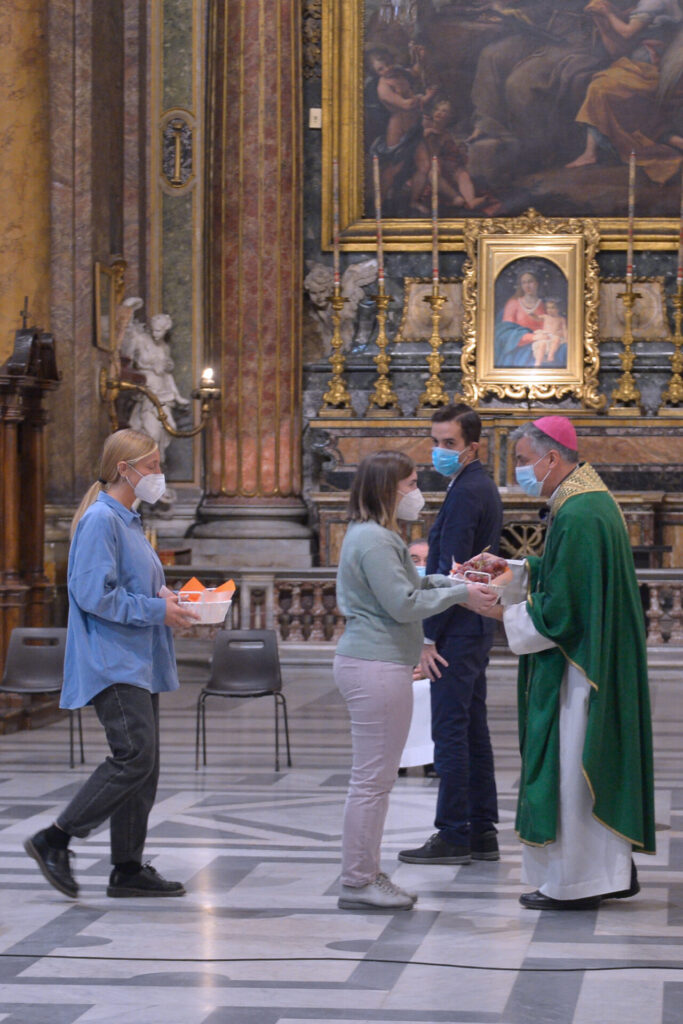
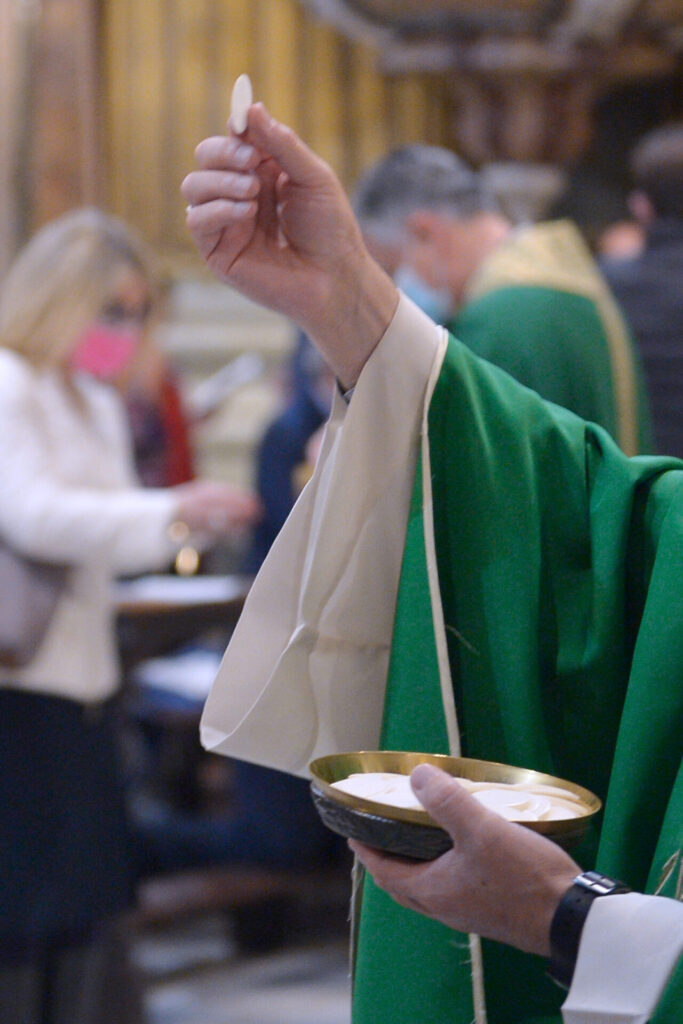
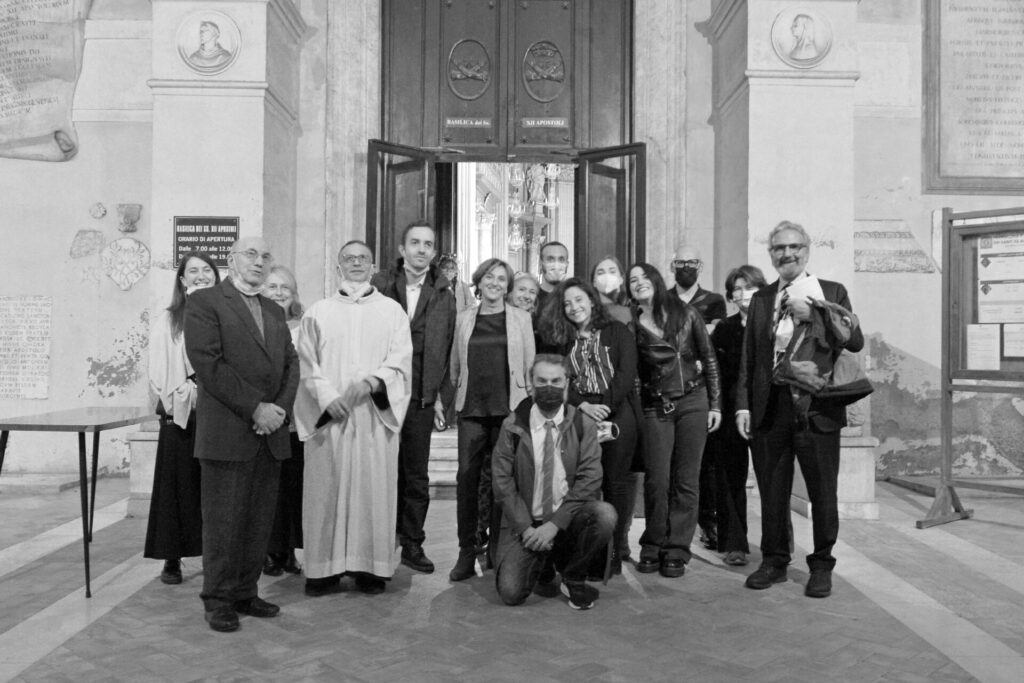
La Fondazione Di Liegro è tra i promotori del “Veglione dell’Intercultura”, in programma mercoledì 30 dicembre a partire dalle ore 21.30, insieme ad alcune organizzazioni che si rifanno al grande insegnamento di don Luigi di Liegro, come il Centro studi e ricerche Idos, il Centro didattico interculturale Celio Azzurro, l'Asilo Munting Tahanan – Center for Filipino Migrant Workers e il Gruppo Welcome Parrocchia S. Pio X.
L'iniziativa, che a causa della pandemia per la prima volta si svolgerà online, rappresenta l'occasione per salutare l’anno vecchio e aspettare l’anno nuovo in una maniera diversa, alternando musica, canti e testimonianze su quale valore dare oggi a concetti come diversità, dialogo, integrazione, convivenza tra italiani e immigrati.
"Il panorama attuale non deve far dimenticare quello che è stato e ancora potrebbe essere l’impatto di una strategia interculturale" ha ricordato presentando l'evento Franco Pittau, fondatore con don Luigi Di Liegro del Dossier statistico immigrazione.
Al Veglione dell’Intercultura interverranno tra gli altri il segretario generale della Fondazione Di Liegro, Luigina Di Liegro, e la sociologa Carla Collicelli, con una riflessione dedicata a don Luigi.
Ci sarà anche un ricordo di Lidia Pittau, scomparsa recentemente, dopo una vita dedicata insieme al marito Franco alla convivenza e alla mediazione interculturale. Verso la metà degli anni ’80, sollecitata da don Luigi Di Liegro, Lidia Pittau lasciò il lavoro professionale e si dedicò interamente alla Caritas diocesana, dove, divenne, a titolo di volontariato, la prima responsabile dell’Area Immigrati della Caritas diocesana e poi del Settore Intercultura. A lei si deve, negli anni '90, Il “Forum dell’Intercultura”, un programma d’azione sostenuto anche da istituzioni nazionali e cittadine, che coinvolse, a Roma specialmente, il mondo della scuola e aiutò a riconoscere i cambiamenti in atto intervenuti e la necessità di una convivenza armoniosa con gli immigrati.
L'evento sarà trasmesso in diretta streaming il 30 dicembre alle 21.30 sul canale YouTube del Centro studi e ricerche Idos: https://www.youtube.com/channel/UCLUZ-s79pzSBt40SAmyJB2A/videos.
Everything is ready for the award ceremony of the Don Luigi Di Liegro International Poetry Prize. The event is scheduled for Saturday 18 September, at 3 pm, in the Throne Room of Palazzo Passarini Falletti in Rome.
The Passarini Falletti palace it is a noble palace located in via Panisperna 207, in the historic center of the capital, precisely in the Monti district. It was built in the first half of the eighteenth century, in place of a previous architectural settlement from the seventeenth century. The Throne Room is a bright environment enriched by Murano chandeliers and a ceiling with wooden coffers.
On this occasion, "Flights of butterflies and bumblebees" will be available, the anthology of the XI edition of the Don Luigi Di Liegro International Poetry Prize, published by “Terra d'ulivi”, with the authors, texts and motivations of the winning works.

Despite the lockdown, which forced the date of the award ceremony of the Don Luigi Di Liegro International Poetry Prize to be moved to September, the 2020 edition recorded "such a large number of works of high literary value", commented the president of the Award, Renato Fiorito. "Despite the difficult conditions - recalled Fiorito - poetry always mysteriously finds its ways to invade the lives of many".
To encourage participation, also due to social distancing regulations, the event will be broadcast live on the Prize Facebook page.
The list of winners of the XI edition of the Don Luigi Di Liegro International Poetry Prize
Let's keep the memory of Luigi Di Liegro alive
It was the summer of magical nights. The summer of the football World Cup. And the invasion of Kuwait by Saddam Hussein (who then led wars to liberate Iraq). It was the summer of the very first cell phones. But it was also the summer of Pantanella, in Rome. The new world, that of immigration, forcefully "landed" in the news. And a priest understood that we couldn't stand by and watch: Don Luigi Di Liegro.
The director of L'Espresso, Marco Damilano, tells it in an article in the issue of the weekly magazine currently on newsstands.
La Pantanella was an old abandoned pasta factory, between Via Casilina and Via Prenestina and a few hundred meters from the Basilica of San Giovanni. A splendid example of industrial archaeology, where hundreds of immigrants moved, evicted from the historic center just before the football World Cup, mostly coming from Pakistan, Bangladesh and India. At the end of that experience, 3,532 people had passed through there, mostly young, educated and with a valid residence permit. They had set up an Italian school, a newspaper, a barber shop and a mosque, as well as developing a code of conduct and organizing a management committee and three working commissions. But it was the inhuman conditions in which these marginalized people found themselves living, without toilets, without water, in dilapidated spaces and surrounded by waste, that attracted the country's attention.
In this fresco remembered by Marco Damilano, the figures of Don Luigi Di Liegro and Dino Frisullo. Don Luigi was at Pantanella every day, among the dispossessed; the journalist describes him as a "meek, peacemaker" who had "never been satisfied" with his "hunger and thirst for justice". On the matter of the former pasta factory, Di Liegro worked incessantly to urge the municipal administration to assume responsibility, for the creation of a plan of interventions and reception centers, which would relieve the marginalized from that inhuman situation. He worked to create a work register, realizing that those people could redeem themselves with work, "with the urgency of someone who knows that there is no time to waste, that something must be done immediately".
Don Luigi, Damilano still remembers, had a profound and formidable knowledge of the Capital, of every place he had in mind "the suffering, the claims, the hopes". As Di Liegro stated, “The City is dramatically experiencing a social dialectic that revolves around the problem of acceptance or rejection of the many bearers of diversity with whom we find ourselves having to live – it is mentioned again in the article – Immigrants, nomads , disabled people, drug addicts, AIDS sufferers, lonely elderly people, teenagers outside their families: all those who cannot participate in economic growth and in the mechanisms that determine it".
Meanwhile, tensions were growing, both in the community that lived in the former pasta factory and outside. The unpreparedness of politics, those who rode the fear of citizens, the racism that was no longer creeping, the disturbing labels of the media: "Lager, Third World City, Ethnic Bomb, Monument of Degradation, Hideout of Terrorists". Much more encouraging is the name given to it by the occupants: "Shish Mahal", in Hurdu for "meeting place" or "crystal house".
The affair ended in January '91 with an eviction, the immigrants were distributed to locations outside Rome. "I saw people in shock. They were taken as if it were a deportation - stated Don Luigi Di Liegro - This story ended in the worst possible way".
Now the Pantanella is home to prestigious offices and apartments. Nearby, there is Pigneto, a small popular village, now trendy among young people. In short, a lot has changed in the city's social fabric. Not the unresolved question of acceptance and marginalization, in short of humanity.
Sergio Zavoli, with his death, leaves an enormous legacy of journalistic competence and human discretion. In his life, he had the opportunity to know and hang out with Don Luigi Di Liegro. As Zavoli recalls in a 2002 article for the monthly magazine Jesus, “I had him among my dear and precious people: to consult, among other things, for my journalistic activity. At the time when I directed Gr1, and then as president of Rai, he was often close to me with generous sensitivity”.
In the article, the journalist resumes his interview with Don Luigi, dating back to 1993, which he defines as "a sort of cry that shakes our consciences. His life itself was ending with the century – writes Zavoli of Di Liegro – He had made it one, determined to brandish the signs that our time, amid great and even atrocious controversies, entrusted to determined men of good will to defend it."
Zavoli quotes a passage from the interview, highlighting the "prophetic words" of Don Luigi, which defined our society and the contradictions of the civil fabric, as "A gargantuan banquet during which the guests devoured everything possible, without paying attention to who would come next".
It is worth rereading that interview today, “because it testifies to his spiritual and human, ethical and civil wealth, but also – states the journalist – for its prophetic power”.
Read the article by Sergio Zavoli with the interview with Don Luigi Di Liegro.
The life of Don Luigi Di Liegro.
Il prossimo 16 ottobre, in occasione di quello che sarebbe stato il suo 91esimo compleanno, ci ritroviamo insieme agli amici e alle amiche della Fondazione per ricordare in musica la nostra costante fonte di ispirazione.
Alle 19.30 presso la chiesa di S. Francesco Saverio Oratorio del Caravita (via del Caravita, 7), ci accompagneranno le note dei giovani artisti della Civica scuola delle Arti di Roma.
Il Concerto è un momento festoso di ricordo. Per questo motivo le formazioni corali della Civica scuola delle Arti di Roma, dirette dal M° Annalisa Pellegrini, giocheranno con i colori della musica a 360°. Il Concerto è dedicato a tutti, dai piccoli ai grandi, e includerà brevi brani polifonici in italiano, inglese e spagnolo, per un abbraccio ideale a tutte le persone che nel mondo conoscono o hanno conosciuto non solo Don Di Liegro, ma anche e soprattutto le sue opere e le attività benefiche che la Fondazione Di Liegro continua a promuovere.
Il corpus centrale del concerto è dedicato ad un autore italiano classico, ma conosciuto da tutti: Antonio Vivaldi. The Coro RomEnsemble eseguirà alcuni dei brani più amati dal pubblico estratti dal Gloria RV 589. Il Concerto si concluderà poi con una sezione dedicata alla musica contemporanea delle grandi colonne sonore di film come "Lea Choristes", "The Gabriel's Oboe" di E. Morricone e "Sister Act": un momento gioioso in cui i protagonisti saranno i COLORI della MUSICA.
On Tuesday 9 May at 5.30 pm, the presentation of the book "La Roma di Don Luigi Di Liegro" edited by Vittorio Roidi will be held in the Hall of the Temple of Hadrian (Rome - Piazza di Pietra). Collection of writings by Don Luigi, the man and priest among the major protagonists of the religious and social life of Rome who dedicated himself to helping the poor and marginalized of the city.
The initiative will be attended by: Marco Damilano, journalist from L'Espresso, Vittorio Roidi, journalist and professor of Ethics and Deontology of Communication, Daniela De Robert, National Guarantor for the Rights of Detainees, Mons. Feroci, Director of Caritas Rome, Lorenzo Tagliavanti, President of the Chamber of Commerce Rome, and Mons. Pansa. Furthermore, the mayor of Rome Virginia Raggi and the President of the Lazio Region Nicola Zingaretti were invited to the event. The meeting will be moderated by Pierciro Galeone, Vice President of the Don Luigi Di Liegro International Foundation.
The Don Luigi Di Liegro International Foundation onlus is a non-profit organization of social utility that aims to keep the memory and thoughts of Don Luigi alive, through the implementation of social solidarity initiatives aimed at increasing respect for the dignity of the person . The Foundation holds the complete archive of the material collected by Don Luigi throughout his life. Due to the wealth of documents, the Archive has been recognized by the Archival Superintendence for Lazio as "of notable historical interest due to the importance it has for the social and cultural history of the 20th century".
Ribbon cutting this morning with the Cardinal Vicar Agostino Vallini who opened the "door" (work of the artist Father Marko Ivan Rupnik) of the Hostel named after Don Luigi Di Liegro, the Roman priest who had made a life choice of Mercy . “A city in which a single man suffers less, is less sad,” Don Luigi loved to repeat, right there, at Termini station, where most of his time was spent in works of charity, solidarity, welcoming the poorest . A few steps from Termini station, this morning a response took shape for the most vulnerable, the excluded of the city, a welcoming and comfortable place to host the homeless for short periods. Moreover, Don Luigi Di Liegro had opened that place on 2 June 1987, on the initiative of the then director of Caritas to whom it is now dedicated, in a property made available by the State Railways and managed from the beginning according to an agreement with the Municipality of Rome. Connected to the Hostel there will be the social canteen, named after Saint John Paul II, which, in addition to the guests welcomed for the night, will offer 500 meals every evening to those who are in difficulty and are reported by the parish listening centers and municipal services . At the inaugural event there were Bishop Nunzio Galantino, general secretary of the Italian Episcopal Conference, the director of Caritas, Monsignor Enrico Feroci and Luigina Di Liegro, founder of the Don Luigi Di Liegro Foundation, together with representatives of important Italian companies that contributed to the realization of the work. The testimony of Don Luigi di Liegro still lives today within the Foundation of the same name, an international, non-profit organization engaged in prevention and fight against social marginalization, on the front of mental distress and unemployment of the over 40s. Solidarity is needed, but we need a new way of conceiving it, we need charity, but now, as Pope Francis tells us, it is the time for Mercy.